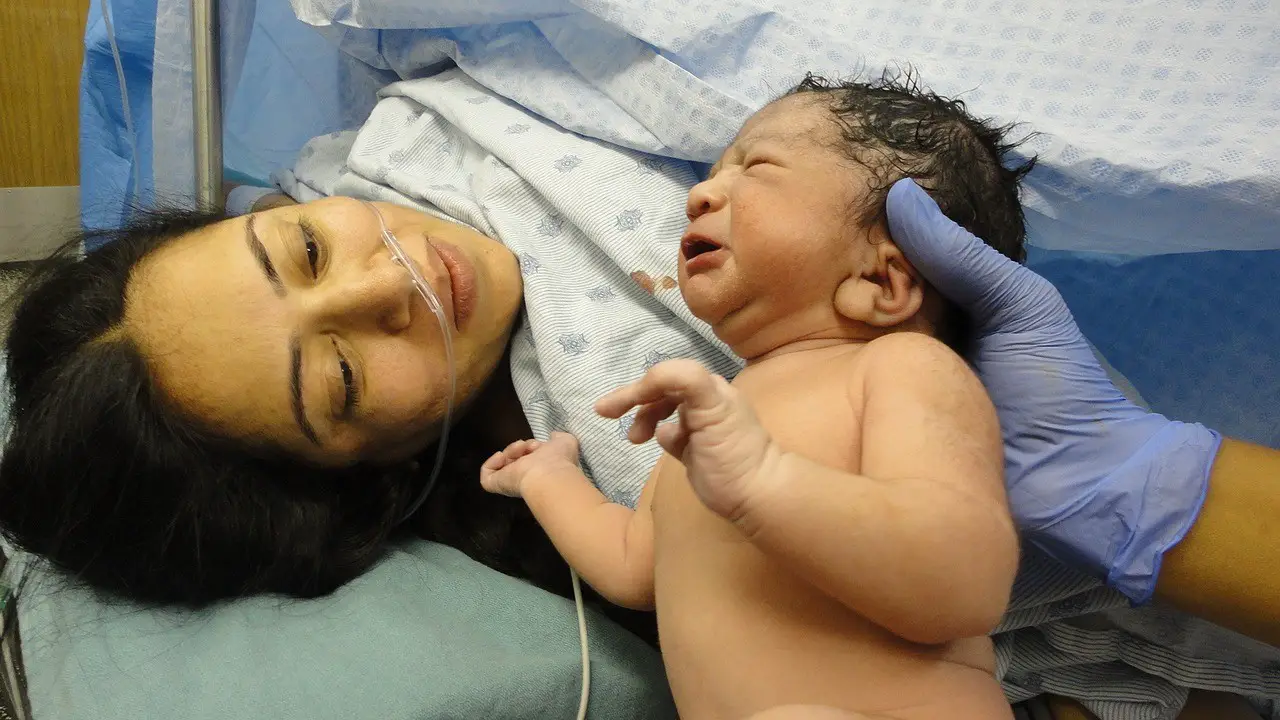Babies fighting sleep is a common struggle faced by many parents. It can be frustrating and even worrisome to see your little one resisting sleep despite apparent exhaustion. There are various underlying reasons for this behavior, ranging from overtiredness and overstimulation to developmental changes and hunger. Understanding these reasons and adjusting sleep routines can help parents ensure their baby gets the rest they need.
Sleep resistance in babies isn’t a sign of disobedience or stubbornness. Instead, it is often a natural response to external and internal factors impacting their ability to fall and stay asleep. Parents need not panic as there are many strategies to help babies overcome sleep resistance and develop healthy sleep habits. By being patient and adjusting to their baby’s unique sleep needs, parents can create an environment conducive to restful slumbers.
Key Takeaways
- Factors like overtiredness, overstimulation, hunger, and developmental changes can cause sleep resistance in babies.
- Understanding the reasons behind sleep resistance can help parents adjust their baby’s sleep routines accordingly.
- Implementing practical solutions, sleep training, and seeking additional resources can help reduce sleep fighting and promote healthy sleep habits in babies.

Factors Influencing Sleep Resistance
Development and Milestones
Babies go through various developmental milestones, which can impact their sleep patterns. As they grow and gain new abilities, they might be eager to practice their newfound skills, even when it’s time to sleep. Creating a consistent sleep routine is essential to help babies navigate these growth spurts and ensure they get proper rest.
Overtiredness and Overstimulation
When babies become overtired or overstimulated, they can have difficulty falling asleep. This is because they may have trouble transitioning from an active state to a calm, sleep-ready state. To prevent this, it’s crucial to keep a close eye on their sleep cues, such as rubbing their eyes, yawning, or fussiness, and to establish a soothing bedtime routine to help them unwind.
Teething and Illnesses
Teething and illnesses can cause discomfort, making it challenging for babies to fall asleep. Babies who are teething might experience pain and swollen gums, affecting their sleep patterns. On the other hand, illnesses, such as colds or ear infections, may also cause sleep disturbances when they result in congestion, fever, or general discomfort. Providing comfort and support, often alongside appropriate remedies, can help ease their symptoms and make sleep more attainable.
Separation Anxiety and Personality
Separation anxiety occurs when a baby becomes distressed upon being away from their primary caregiver. This emotional response can lead the baby to resist sleep, as they don’t want to be apart from their parent. Addressing separation anxiety might involve making gradual adjustments in the bedtime routine to help the baby feel safe and secure. Additionally, each baby has a unique personality, and some may have a natural predisposition to be more wakeful or resistant to sleep. It’s essential to be patient and develop a customized sleep plan that suits the individual needs and temperament of the baby.

Sleep Patterns and Rhythms
Circadian Rhythms
Babies sleep patterns are primarily influenced by their circadian rhythms, which are biological processes that occur in roughly 24-hour cycles. These rhythms are influenced by external cues such as light and temperature. Newborns’ circadian rhythms are not yet fully developed. Hence their sleep patterns can be irregular. As infants grow, their circadian rhythms become more established, typically around 3-4 months old. This leads to more predictable sleep-wake cycles, with nighttime sleep consolidating daytime naps into a routine.
REM Sleep
Rapid eye movement (REM) sleep is a crucial stage of the sleep cycle, characterized by eye movements and vivid dreams. During REM, the brain is highly active, facilitating essential processes such as memory consolidation. Interestingly, babies spend a significant amount of time in REM sleep, up to 50% of their total sleep. This is essential for their cognitive and neurological development. However, the downside is that they can be more easily awakened due to the light nature of this sleep stage.
Sleep Cycles
Sleep cycles comprise various stages, including non-REM sleep, REM sleep, and wakefulness. An adult’s sleep cycle typically lasts around 90 minutes; however, a newborn’s sleep cycle is shorter, at approximately 45 minutes. As babies’ sleep cycles are shorter and they spend more time in REM sleep, they experience more frequent wake windows. These wake windows can be challenging for parents, as babies may struggle to fall asleep and appear to be fighting their sleep. Consequently, it is essential to understand and adapt to a baby’s unique sleep patterns and rhythms to help them establish healthier sleep habits.
Practical Solutions to Help Babies Sleep
Detecting Sleep Cues and Sleepiness
Babies often give subtle cues when they start to feel sleepy. Parents should pay attention to signs such as yawning, eye rubbing, fussiness, and decreased activity. Recognizing these sleep cues can help put the baby to bed before they become overtired. Responding to these signals promptly makes it easier for the baby to fall asleep.
Establishing a Bedtime Routine
Creating a consistent bedtime routine can also help babies transition into sleep. This routine may consist of activities such as bathing, feeding, reading books, and singing lullabies. It is essential to ensure that the routine is soothing and relaxing. Additionally, maintaining a consistent sleep environment with dim lighting and white noise can help set the mood for sleep.
- Bedtime routine ideas:
- Feeding
- Warm bath
- Reading books or telling stories
- Singing lullabies
- Playing soft, calming music
Swaddling and Rocking Techniques
Swaddling can be an effective way to help babies sleep by providing a sense of security. The snug feeling of the swaddle mimics the womb, making the baby feel more comfortable. However, it’s important to follow safe swaddling guidelines and ensure the baby is not too tightly wrapped or overheated.
Gentle rocking or swaying can also soothe babies and promote sleep. Incorporating a rocking chair or using a baby swing can be beneficial in calming the baby. Coupling rocking with white noise or soft music can further increase the baby’s likelihood of falling asleep.
| Technique | Tips |
|---|---|
| Swaddling | Use a lightweight, breathable fabric; ensure proper fit and airflow |
| Rocking/Swaying | Use a rocking chair or baby swing; combine with calming sounds |
Incorporating these techniques into your baby’s sleep routine can help parents avoid unnecessary sleep battles and promote healthy sleep habits for their child.

Sleep Training and Reducing Sleep Fighting
Understanding Sleep Regressions
Sleep regressions are periods when a baby’s sleep patterns suddenly change, often becoming erratic or less restful. These can be due to developmental milestones or changes in the baby’s environment. Parents must understand that sleep regressions are a natural part of a child’s development.
During sleep regressions, it’s crucial not to abandon any established sleep training methods. Consistency helps the baby navigate these challenging periods and eventually return to regular sleep. Patience and understanding are vital as parents assist their babies through sleep regressions.
Managing Naps and Sleep Schedules
A well-established sleep schedule is essential in preventing a baby from fighting their sleep. Babies thrive on consistency, and having predictable daily routines can help regulate their internal clocks. Establishing a regular nap and bedtime schedule benefits both the baby and the parents.
When managing a sleep schedule, consider the following guidelines:
- Observe the baby’s natural sleep patterns and tailor the schedule accordingly.
- Create a calming and consistent pre-nap and bedtime routine.
- Ensure the baby’s sleep environment is conducive to restful sleep, such as having a dark room and using white noise.
- Gradually adjust the schedule as the child grows, and their sleep needs evolve.
By consistently implementing these practices, parents can create an environment that nurtures healthy sleep habits and reduces the likelihood of the baby fighting their sleep.
Additional Resources and Education
Various resources and educational materials are available to help understand why babies fight their sleep and provide guidance for parents and caregivers. Gathering information from reliable sources and expanding one’s understanding of this common issue is essential.
Numerous books and articles written by experts can provide insights on this topic and how it affects the well-being of babies and families. These publications often include practical advice, age-appropriate sleep schedules, and various techniques parents can implement to promote healthy sleep habits.
Online platforms like parenting forums and support groups can also be a great way for parents to connect with others experiencing similar challenges. Sharing experiences and advice can be helpful while navigating the complexities of infant sleep patterns.
Regarding professional guidance, seeking advice from pediatricians or sleep consultants is beneficial. These experts can offer personalized recommendations based on a baby’s needs and circumstances, ensuring the best action for each unique situation. It’s important to remember that while general guidance is useful, the ideal approach might differ from one baby to another.
For those interested in expanding their knowledge formally, several educational courses focusing on infant sleep are available from reputable institutions. These courses cover various topics such as sleep training, sleep environments, and best practices to address sleep resistance. They aim to give participants a solid foundation for understanding and managing their baby’s sleep challenges.
In conclusion, ample resources are available for parents seeking to understand better why babies fight their sleep. By exploring reliable sources and seeking professional guidance, caregivers can confidently address sleep-related issues and provide their babies with a healthy start in life.
Frequently Asked Questions
Why do babies resist sleep at different ages?
Babies resist sleep at different ages due to various developmental milestones and changes in their sleep patterns. Babies may find it harder to settle down and sleep at certain stages, such as growth spurts, teething, and learning new skills. These factors can cause temporary disruptions in their sleep routines.
What makes babies fight sleep during the day?
Babies may fight sleep during the day for several reasons, such as overstimulation, tiredness, hunger, or an inconsistent sleep schedule. Ensuring a calm environment, following a routine, and paying attention to sleep cues can help address these issues and promote more restful daytime sleep.
What causes babies to struggle with sleep at night?
Struggling with sleep at night can be caused by overtiredness, hunger, or an uncomfortable sleep environment. An inconsistent bedtime routine or underlying medical issue might sometimes contribute to night-time sleep struggles. Identifying and addressing these factors can improve the quality of sleep babies get at night.
How can I help my baby stop resisting sleep?
To help your baby stop resisting sleep, create a consistent sleep routine, provide a comfortable sleep environment, and address any underlying issues such as hunger, overtiredness, or discomfort. Be patient and allow time for your baby to adjust to the routine and develop healthy sleep habits.
Is it normal for babies to battle sleep?
It is normal for babies to battle sleep occasionally, especially during developmental milestones or changes in their sleep patterns. However, persistent sleep struggles might warrant further investigation and possibly consultation with a pediatrician to identify underlying issues.
How can I identify if my baby is merely fighting sleep?
If a baby is merely fighting sleep, it might show signs of restlessness, fussiness, or even brief drowsiness followed by sudden wakefulness. Paying attention to these cues and providing a consistent sleep routine can help manage sleep resistance and improve overall sleep quality for your baby.
- Is It OK to Put Baby to Sleep Without Burping? Unveiling the Facts - February 13, 2024
- How To Get Rid Of Anxiety Forever: Long-Term Strategies For Well-Being - February 13, 2024
- How to Sleep with Curly Hair: Overnight Curls Care Tips - February 13, 2024
This site contains affiliate links to products. We will receive a commission for purchases made through these links.




